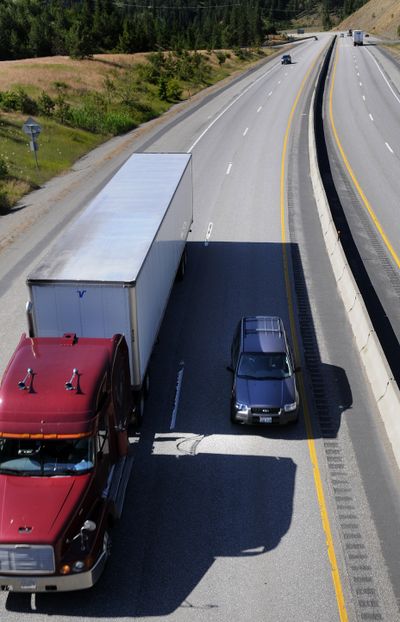Changes steer new Idaho roads study
Methods tightened to measure whether vehicle fees, taxes fair

BOISE – Idaho wants to know whether owners of heavy trucks and cars are paying their fair share for roads.
A previous study on the subject suggested heavy trucks underpay and owners of cars and pickups pay too much in transportation fees and taxes. But problems with data that suggested the study might not be valid prompted the state transportation director to scrap it in 2007.
This time, Idaho will follow the examples of other states, using new Federal Highway Administration methodology that recently worked well for Nevada and appointing an advisory committee from all sides to oversee the study, as Oregon did.
Idaho Gov. Butch Otter said he’s all for that. “You’ve got to have those folks sitting at the table,” he said. “Even if they believe they’re being in one way or another knocked out of balance … they should all be considered, and we shouldn’t be afraid of that information.”
In Oregon, the question of whether cars and trucks paid their fair share became so political that voters in 1999 amended the state constitution to require highway cost allocation studies every two years, with the Legislature tasked to adjust taxes or fees based on the results to keep things equitable.
Oregon state economist Tom Potiowsky said the system has worked well there, where representatives of the state’s trucking association, the AAA, counties and experts serve on an advisory committee to oversee the study; he chairs the panel. The committee can’t change the results, which are developed by an outside consultant.
“You have the stakeholders in the room together, they’re seeing how the sausage is made, and they have input based on their opinions,” Potiowsky said. “They understand they are only advisory, but I think it makes for a richer outcome. Over time, it has reduced the politics.”
Pam Lowe, Idaho’s transportation director, said the advisory panel to oversee the new highway cost study likely will include representatives from the state’s trucking association and from AAA Idaho, among others. Keith Allred, head of The Common Interest citizens group, which has been studying the transportation funding issue, said an advisory panel can be helpful, “as long as it remains clear that they are in an advisory capacity, and that it is the researchers who make the final determination on accurate assumptions and methodology.”
The scrapped 2007 study did have some problems, said Allred, a former Harvard professor. “The authors themselves talk about the problems with the data they were using.” But, he said, “it would not be surprising if the final study comes out with similar results.”
Allred noted that the 2007 study showed that heavy trucks are underpaying, compared to their impact on roads, to the tune of $98 million.
Although the governor has been talking about a $240 million annual shortfall in road maintenance in Idaho, Allred said the study, if valid, may point to a smaller shortfall, since it showed that car and pickup owners were paying their share for their impact on roads.
“Essentially, the entire shortfall could be made up simply by heavy truckers paying their fair share,” he said.
Lowe said a new highway cost allocation study could be done in a matter of months, allowing the results to be used by the governor’s newly named task force that will study transportation funding.
Otter named the task force after lawmakers this year, despite dozens of vetoes and the governor’s urgent pleading, refused to enact his proposed tax and fee increases to pay for road upkeep. Otter said it remains a pressing need.
“Deferred maintenance is no different from borrowing money into the future without a way to pay it back,” he said, “because someday that deferred maintenance is going to catch up with us.”